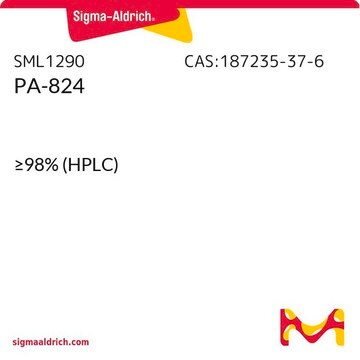Fontos dokumentumok
SML4007
TMC207

≥98% (HPLC)
Szinonimák:
(αS,βR)-6-Bromo-α-[2-(dimethylamino)ethyl]-2-methoxy-α-1-naphthalenyl-β-phenyl-3-quinolineethanol, (1R, 2S)-1-(6-Bromo-2methoxy-3-quinolinyl)-4-(dimethylamino)-2-(1-naphthalenyl)-1-phenyl-2-butanol, Bedaquiline, R 207910, R-207910, R207910
About This Item
Javasolt termékek
Minőségi szint
Teszt
≥98% (HPLC)
form
powder
optikai aktivitás
[α]/D 195.0 to 155.0° (c = 0.5g/100mL in DMF)
szín
white to beige
oldhatóság
DMSO: 2 mg/mL, clear
tárolási hőmérséklet
-10 to -25°C
SMILES string
BrC(C=C1)=CC2=C1N=C(OC)C([C@@H](C3=CC=CC=C3)[C@](O)(C4=CC=CC5=C4C=CC=C5)CCN(C)C)=C2
Biokémiai/fiziológiai hatások
TMC207 (Bedaquiline; R207910) is an orally active, potent and selective mycobacterial ATP synthase inhibitor (M. smegmatis IC50 = 2.5 nM or 1.4 ng (non-salt form)/mL; human mitochondrial ATP syntase IC50 >200 uM) with broad-spectrum anti-mycobacterial activity (MIC 10-120 ng/mL), including M. bovis, avium complex (MAC), kansasii, marinum, fortuitum, abscessus, smegmatis, ulcerans, and both drug-susceptible and multiple drug-resistant M. tuberculosis strains (to rigampin, isoniazid, streptomycin, ethambutol, pyrazinamide, fluoroquinolone).
Figyelmeztetés
Warning
Figyelmeztető mondatok
Óvintézkedésre vonatkozó mondatok
Veszélyességi osztályok
Aquatic Chronic 1
Tárolási osztály kódja
11 - Combustible Solids
WGK
WGK 3
Lobbanási pont (F)
Not applicable
Lobbanási pont (C)
Not applicable
Analitikai tanúsítványok (COA)
Analitikai tanúsítványok (COA) keresése a termék sarzs-/tételszámának megadásával. A sarzs- és tételszámok a termék címkéjén találhatók, a „Lot” vagy „Batch” szavak után.
Már rendelkezik ezzel a termékkel?
Az Ön által nemrégiben megvásárolt termékekre vonatkozó dokumentumokat a Dokumentumtárban találja.
Tudóscsoportunk valamennyi kutatási területen rendelkezik tapasztalattal, beleértve az élettudományt, az anyagtudományt, a kémiai szintézist, a kromatográfiát, az analitikát és még sok más területet.
Lépjen kapcsolatba a szaktanácsadással








